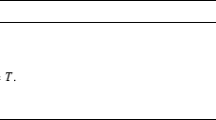Abstract
In the minimum entropy set cover problem, one is given a collection of k sets which collectively cover an n-element ground set. A feasible solution of the problem is a partition of the ground set into parts such that each part is included in some of the k given sets. The goal is to find a partition minimizing the (binary) entropy of the corresponding probability distribution, i.e., the one found by dividing each part size by n. Halperin and Karp have recently proved that the greedy algorithm always returns a solution whose cost is at most the optimum plus a constant. We improve their result by showing that the greedy algorithm approximates the minimum entropy set cover problem within an additive error of 1 nat = log2 e bits ≃ 1.4427 bits. Moreover, inspired by recent work by Feige, Lovász and Tetali on the minimum sum set cover problem, we prove that no polynomial-time algorithm can achieve a better constant, unless P = NP. We also discuss some consequences for the related minimum entropy coloring problem.
Preview
Unable to display preview. Download preview PDF.
Similar content being viewed by others
References
Alon, N., Orlitsky, A.: Source coding and graph entropies. IEEE Trans. Inform. Theory 42(5), 1329–1339 (1996)
Cardinal, J., Fiorini, S., Joret, G.: Minimum entropy coloring. In: Deng, X., Du, D.-Z. (eds.) ISAAC 2005. LNCS, vol. 3827, pp. 819–828. Springer, Heidelberg (2005)
Feige, U.: A threshold of ln n for approximating set cover. J. ACM 45(4), 634–652 (1998)
Feige, U., Kilian, J.: Zero knowledge and the chromatic number. J. Comput. System Sci. 57(2), 187–199 (1998); Complexity 96—The Eleventh Annual IEEE Conference on Computational Complexity, Philadelphia, PA
Feige, U., Lovász, L., Tetali, P.: Approximating min sum set cover. Algorithmica 40(4), 219–234 (2004)
Feller, W.: An introduction to probability theory and its applications, 3rd edn., vol. I. John Wiley & Sons Inc., New York (1968)
Grötschel, M., Lovász, L., Schrijver, A. (eds.): Geometric algorithms and combinatorial optimization, 2nd edn. Algorithms and Combinatorics, vol. 2. Springer, Berlin (1993)
Halperin, E., Karp, R.M.: The minimum-entropy set cover problem. Theoret. Comput. Sci. 348(2-3), 240–250 (2005)
Hardy, G.H., Littlewood, J.E., Pólya, G.: Inequalities. Cambridge Mathematical Library. Cambridge University Press, Cambridge (1988); Reprint of the 1952 edition
Nakamura, D., Tamura, A.: A revision of Minty’s algorithm for finding a maximum weight stable set of a claw-free graph. J. Oper. Res. Soc. Japan 44(2), 194–204 (2001)
Author information
Authors and Affiliations
Editor information
Editors and Affiliations
Rights and permissions
Copyright information
© 2006 Springer-Verlag Berlin Heidelberg
About this paper
Cite this paper
Cardinal, J., Fiorini, S., Joret, G. (2006). Tight Results on Minimum Entropy Set Cover. In: Díaz, J., Jansen, K., Rolim, J.D.P., Zwick, U. (eds) Approximation, Randomization, and Combinatorial Optimization. Algorithms and Techniques. APPROX RANDOM 2006 2006. Lecture Notes in Computer Science, vol 4110. Springer, Berlin, Heidelberg. https://doi.org/10.1007/11830924_8
Download citation
DOI: https://doi.org/10.1007/11830924_8
Publisher Name: Springer, Berlin, Heidelberg
Print ISBN: 978-3-540-38044-3
Online ISBN: 978-3-540-38045-0
eBook Packages: Computer ScienceComputer Science (R0)




